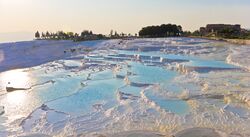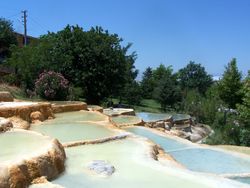محافظة دنيزلي
Denizli Province
Denizli ili | |
|---|---|
 | |
 موقع محافظة دنيزلي في تركيا | |
 مقاطعات محافظة دنيزلي | |
| البلد | تركيا |
| المنطقة | إيجة |
| الإقليم | آيدين |
| الحكومة | |
| • الدائرة الانتخابية | دنيزلي |
| • الوالي | علي فؤاد عتيق |
| المساحة | |
| • الإجمالي | 12٬321 كم² (4٬757 ميل²) |
| التعداد (2018) | |
| • الإجمالي | 1٬027٬782 |
| • الكثافة | 83/km2 (220/sq mi) |
| مفتاح الهاتف | 0258 |
| لوحة السيارة | 20 |
محافظة دنيزلي (تركية: Denizli ili ؛ Denizli Province)، هي إحدى محافظات تركيا، وتقع غرب الأناضول على ساحل إيجة. ويحيط بها محافظات عشاق من الشمال، وبوردور وإسپرطة وأفيون من الشرق، وآيدين ومانيسا من الغرب وموغلا من الجنوب. وتقع بين الإحداثيات 28° 30’ و 29° 30’ شرقاً و 37° 12’ و 38° 12’ شمالاً. مساحتها 11.868 كم²، وعدد سكانها 931.823 نسمة، وعاصمتها مدينة دنيزلي.
. . . . . . . . . . . . . . . . . . . . . . . . . . . . . . . . . . . . . . . . . . . . . . . . . . . . . . . . . . . . . . . . . . . . . . . . . . . . . . . . . . . . . . . . . . . . . . . . . . . . . . . . . . . . . . . . . . . . . . . . . . . . . . . . . . . . . . . . . . . . . . . . . . . . . . . . . . . . . . . . . . . . . . . .
المقاطعات
تنقسم محافظة دنيزلي إلى 19 مقاطعة (المقاطعة العاصمة بالخط العريض):
|
|
الجغرافيا
Approximately 28-30% of the land is plain, 25% is high plateau and tableland, and 47% is mountainous. At 2571m Mount Honaz is the highest in the province, and indeed in Western Anatolia. Babadag in the Mentes range has a height of 2308 meters. The biggest lake in Denizli is Acıgöl, which means bitter lake and indeed industrial salts (sodium sulphate) are extracted from this lake which is highly alkaline. There is a thermal spring to the west of Sarayköy, at the source of the Great Menderes River, which contains bicarbonates and sulfates. There is another hot spring in Kızıldere which reaches 200˚C. A geothermal steam source was first found in the region in 1965 during drilling work. Today there is a power plant producing electricity from the geothermal steam. Only 11% of the geothermal energy source is used to produce electricity and 89% of it, which flows into the Great Menderes, is 150˚C at source (it is contains energy equal to 35,000 to 40,000 tonnes of fuel oil).
المناخ
التاريخ
القِدم
There are traces of prehistoric cultures throughout the province, including evidence of pre-Hittite cultures and the Hittites themselves. The Hittites were followed by Phrygians, Lydians and Persians, and then cities founded by the ancient Greeks and Alexander the Great. The first real settlement was the city of Laodicea on the Lycus which was established by King Antiochus II for his wife Laodice. Laodicea is located 6 km north of the city of Denizli. The city of Hierapolis was established around 190 BC by the Pergamene Kingdom, one of the Hellenistic states of Anatolia. The calcified terraces and pools of Pamukkale (Cotton Castle) now stand below the ruins of Hierapolis. The two cities, Laodicea and Hierapolis later came under Roman rule, and with the division of the Empire in 395 were left within the boundaries of the East Roman Empire.
الفترة المسيحية
The province has strong biblical connections: in the Book of Revelation, John the Evangelist hears a loud voice which sounded like a trumpet when he was on the island of Patmos. The voice says: "Write down what you see and send the book to the Churches in these seven cities: Ephesus, Smyrna, Pergamum, Thyatira, Sardis, Philadelphia and Laodicea". The Church of Laodicea was a sacred place even in pre-Christian times, and is still visited by Christians today, although it lost its importance to a great extent during Byzantine rule.
الفترة التركية
Turks were first seen in Denizli in 1070 when Afşin Bey, under the control of the Seljuk Sultan Alp Arslan, raided the area. The second and third Crusades fought here against the Seljuk Turks under the command of Kazıkbeli, who managed to flee with a small force to Antalya which was also captured by the Crusaders. Later, after the Turks had established control of the ancient cities, they moved south to the site of the present city of Denizli, where drinking water was brought through stone pipes. The name Laodicea slowly changed into “Ladik” then since the 17th century other names were given “Tonguzlu”, ”Tonuzlu”, ”Tenguzlug”, ”Donuzlu” and finally “Denizli”. After World War I, when the Greek Army captured the city of İzmir on May 15, 1919, one of the first centres of Turkish resistance formed at an open-air meeting in Denizli. A Turkish militia formed lines on the Menderes organized by Yörük Ali and Demirci Efe, involving large numbers of volunteers from the local peasantry. Stiffened by the Turkish regular army, Greek forces were repelled, and Denizli remained in Turkish hands throughout the Greco-Turkish War.
أهم الأماكن
- Laodicea ad Lycum - Ruins of the ancient city located north of Denizli, about 1 km north of the village of Eskihisar.
- Hierapolis and Pamukkale -20 km north of Denizli. The ruins of the ancient city and the hillside covered in minerals from the thermal waters.
- The Seljuk caravanserai Akhan, 6 km from Denizli on the Ankara highway.
and near the other districts in the province....
- Tripolis (Phrygia) near the village of Yenicekent in Buldan - ruins of a city dating back to the Hellenistic period.
- a few remains of the ancient city of Colossae, in Honaz.
- Beycehöyük in Çivril, where several antiquities of the Copper Age dating back to 3000 BC were found.
- The Hanabat Caravanserai in Çardak is a typical Seljuk caravanserai.
- The Ahmetli Bridge over the Great Menderes river, 15 km from Sarayköy dates back to the Roman era.
ديك دنيزلي
Denizli is renowned in Turkey for having a famous breed of cock, renowned for its appearance and colour, along with its prolonged and melodious crows. Great effort is taken by the state and local farmers to preserve the breed. In appearance the Denizli cock has black eyes, dark grey legs, a long neck, and a red crown. It weighs 3-3.5 kg, and has a distinctive crow.
. . . . . . . . . . . . . . . . . . . . . . . . . . . . . . . . . . . . . . . . . . . . . . . . . . . . . . . . . . . . . . . . . . . . . . . . . . . . . . . . . . . . . . . . . . . . . . . . . . . . . . . . . . . . . . . . . . . . . . . . . . . . . . . . . . . . . . . . . . . . . . . . . . . . . . . . . . . . . . . . . . . . . . . .
انظر أيضاً
المصادر
وصلات خارجية
 Media related to محافظة دنيزلي at Wikimedia Commons
Media related to محافظة دنيزلي at Wikimedia Commons- الموقع الرسمي لحاكم دنيزلي (إنگليزية)
- الموقع الرسمي لبلدية دنيزلي (لغة تركية)
- خريطة دنيزلي
- صورة بالقمر الصناعي (لغة تركية)
- The Rooster Cock of Denizli
- Denizli Weather Forecast Information (إنگليزية)
- Denizli Telephone Address Book, Guide
- Pages using gadget WikiMiniAtlas
- Short description matches Wikidata
- Short description is different from Wikidata
- Pages using infobox settlement with no coordinates
- Pages using Lang-xx templates
- Articles with hatnote templates targeting a nonexistent page
- محافظات تركيا
- محافظة دنيزلي
- Coordinates on Wikidata
- منطقة إيجه







